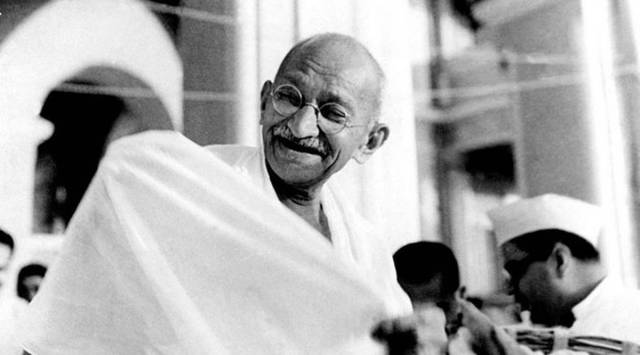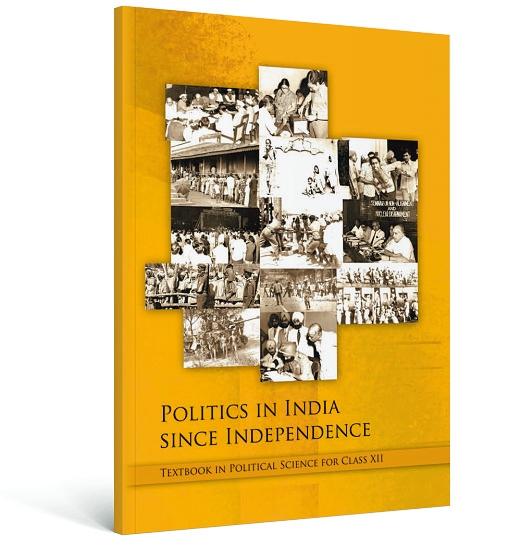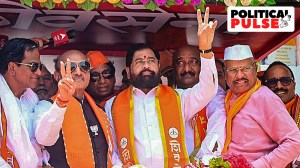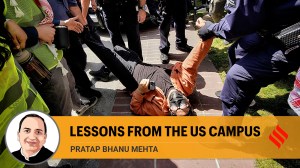- India
- International
Purged from NCERT Textbooks: Hindu extremists’ dislike for Gandhi, RSS ban after assassination
When The Indian Express asked why changes pertaining to Mahatma Gandhi’s assassination did not make it to NCERT’s official document released in June 2022, but directly introduced in the reprinted textbooks, NCERT director DS Saklani insisted “there is nothing new” this time.
 Last year, NCERT had rationalised textbooks for all subjects to reduce curriculum load further to help students make a “speedy recovery” in learning, which has been hit by Covid-19 disruptions.
Last year, NCERT had rationalised textbooks for all subjects to reduce curriculum load further to help students make a “speedy recovery” in learning, which has been hit by Covid-19 disruptions. * He (Gandhi) was particularly disliked by those who wanted Hindus to take revenge or who wanted India to become a country for the Hindus, just as Pakistan was for Muslims…
* His steadfast pursuit of Hindu-Muslim unity provoked Hindu extremists so much that they made several attempts to assassinate Gandhiji…
* Gandhiji’s death had an almost magical effect on the communal situation in the country… The Government of India cracked down on organisations that were spreading communal hatred. Organisations like the Rashtriya Swayamsewak Sangh were banned for some time…
These sentences that have been taught to Class 12 students for more than 15 years as part of their Political Science curriculum now stand deleted from NCERT textbooks.
So does the reference to Gandhi’s assassin Nathuram Godse as “a Brahmin from Pune” and “the editor of an extremist Hindu newspaper who had denounced Gandhiji as ‘an appeaser of Muslims’” from a Class 12 History textbook.

 Among key deletions on Gandhi’s assassination in NCERT class 12 texts are these lines.
Among key deletions on Gandhi’s assassination in NCERT class 12 texts are these lines.
Significantly, the above deletions did not figure in the “list of rationalised content” officially released by the National Council of Educational Research and Training (NCERT) in June last year.
However, the above sentences and references are missing from the new textbooks (with rationalised content) that hit the market recently, a scrutiny of the reprinted books by The Indian Express has revealed.
Last year, NCERT had rationalised textbooks for all subjects to reduce curriculum load further to help students make a “speedy recovery” in learning, which has been hit by Covid-19 disruptions. The changes were announced via a booklet that was uploaded on the Council’s official website and also formally shared with all schools. The textbooks (with rationalised content) were not reprinted last year due to shortage of time. The new books, however, have now hit the market and are available for the new academic year 2023-24.
 Deleted lines from the Class 12 Political Science book
Deleted lines from the Class 12 Political Science book
When asked why changes pertaining to Mahatma Gandhi’s assassination did not make it to NCERT’s official document released in June 2022, but directly introduced in the reprinted textbooks, NCERT director DS Saklani insisted “there is nothing new” this time. “Rationalisation happened last year. We have not done anything new this time,” he told The Indian Express. His colleague and head of NCERT’s Central Institute of Educational Technology, AP Behera said, “It is possible some bits may have been left out of the table due to oversight but no new changes have been made this year. This all happened last year.”
Consider some of the most glaring changes introduced in the reprinted textbooks this year that were missing from NCERT’s “list of rationalised content” released in June 2022:
* The third and last reference to the Gujarat riots in NCERT textbooks has been dropped from the Class 11 Sociology textbook titled ‘Understanding Society’. NCERT has deleted a paragraph that talks about how class, religion and ethnicities often lead to segregation of residential areas and it then cites the communal violence in Gujarat in 2002 to illustrate how communal violence furthers ghettoisation.
The deleted paragraph reads: “Where and how people will live in cities is a question that is also filtered through socio-cultural identities. Residential areas in cities all over the world are almost always segregated by class, and often also by race, ethnicity, religion and other such variables. Tensions between such identities both cause these segregation patterns and are also a consequence. For example, in India, communal tensions between religious communities, most commonly Hindus and Muslims, results in the conversion of mixed neighbourhoods into single-community ones. This in turn gives a specific spatial pattern to communal violence whenever it erupts, which again furthers the ‘ghettoisation’ process. This has happened in many cities in India, most recently in Gujarat following the riots of 2002.”
 Book: Politics In India Since Independence
Book: Politics In India Since Independence
With the removal of the above paragraph, all NCERT social science textbooks for Classes 6 to 12 have been purged of all references to the Gujarat riots.
The Council had officially announced deletion of two references to the Gujarat riots from the last chapter of the Class 12 political science textbook titled ‘Politics in India Since Independence and the Class 12 sociology textbook ‘Indian Society’ in its “list of rationalised content” released in June last year.
* In the first chapter of the Class 12 Political Science textbook ‘Politics in India since Independence’, NCERT has removed sentences on how Hindu extremists particularly disliked Mahatma Gandhi and had made several attempts to assassinate him. This was mentioned under the subheading ‘Mahatma Gandhi’s sacrifice’.
“He (Gandhi) was particularly disliked by those who wanted Hindus to take revenge or who wanted India to become a country for the Hindus, just as Pakistan was for Muslims. They accused Gandhiji of acting in the interests of the Muslims and Pakistan. Gandhiji thought that these people were misguided. He was convinced that any attempt to make India into a country only for the Hindus would destroy India. His steadfast pursuit of Hindu-Muslim unity provoked Hindu extremists so much that they made several attempts to assassinate Gandhiji,” the deleted passage reads.
NCERT has also dropped the reference to the government’s ban on the Rashtriya Swayamsewak Sangh following Gandhi’s assassination.
The deleted sentences read, “Gandhiji’s death had an almost magical effect on the communal situation in the country. Partition-related anger and violence suddenly subsided. The Government of India cracked down on organisations that were spreading communal hatred. Organisations like the Rashtriya Swayamsewak Sangh were banned for some time. Communal politics began to lose its appeal.”
However, the remaining content under the subheading ‘Mahatma Gandhi’s sacrifice’ mentions Gandhi’s visit to Kolkata on August 15, 1947, which was torn by Hindu-Muslim riots at that time and his subsequent efforts to persuade Hindus and Muslims to give up violence. It also briefly describes his assassination.
“Finally, on 30 January 1948, one such extremist, Nathuram Vinayak Godse, walked up to Gandhiji during his evening prayer in Delhi and fired three bullets at him, killing him instantly.”
* In the Class 12 History textbook titled ‘Themes In Indian History Part III’, the Council has dropped a “Brahmin” reference to Godse and that he was “the editor of an extremist Hindu newspaper”.
The paragraph pertaining to Gandhi’s assassination in the chapter titled “Mahatma Gandhi and the Nationalist Movement” earlier read: “At his daily prayer meeting on the evening of 30 January, Gandhiji was shot dead by a young man. The assassin who surrendered afterwards, was a Brahmin from Pune named Nathuram Godse, the the editor of an extremist Hindu newspaper who had denounced Gandhiji as ‘an appeaser of Muslims’.”
The revised paragraph now reads: “At his daily prayer meeting on the evening of 30 January, Gandhiji was shot dead by a young man. The assassin, who surrendered afterwards, was Nathuram Godse.”
Sponsored | Empowering Leadership through AI Integration: Catalysing Business Transformation
Must Read
Apr 27: Latest News
- 01
- 02
- 03
- 04
- 05









































